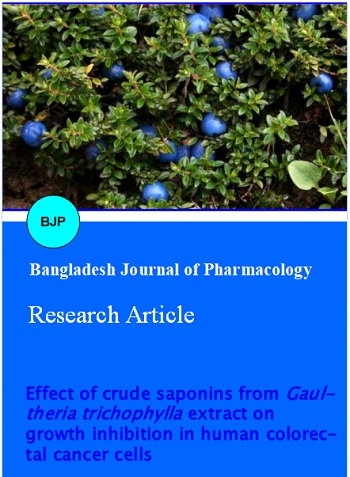Effect of crude saponins from Gaultheria trichophylla extract on growth inhibition in human colorectal cancer cells
DOI:
https://doi.org/10.3329/bjp.v10i1.21462Keywords:
Apoptosis, G. trichophylla, MTT, SaponinsAbstract
The genus Gaultheria also comprised of species with reported cytotoxic activities. Current research work was carried out to evaluate G. trichophylla crude extract and respective saponins fraction against human colorectal cancer cell line (Caco-2) based on cell viability assays. Caco-2 cells treated with the crude extract showed significant growth inhibition (p< 0.001) in a dose dependent manner with apparent IC50 value of 200 ?g/mL and 100 ?g/mL in MTT and NRU assays respectively. The fractioned crude saponins showed an enhanced response and inhibited the growth of Caco-2 by 93.6 and 97.4% in MTT and NRU assays respectively, with compared to actinomycin-D (65%). The DAPI staining of cell treated with crude saponins observed under confocal microscope showed shrunken nuclei with apparent nuclear fragmentation and chromatin condensation indicating apoptosis mode of cell death. The study exhibited that the G. Trichophylla saponins induced apoptosis of Caco-2 cell lines. This study provides new evidences to further explore this plant for the novel targets in anticancer drug development.
Downloads
427
310 Read
176

Published
How to Cite
Issue
Section
License
Authors who publish with this journal agree to the following terms:
- Authors retain copyright and grant the journal right of first publication with the work simultaneously licensed under a Creative Commons Attribution License that allows others to share the work with an acknowledgement of the work's authorship and initial publication in this journal.
- Authors are able to enter into separate, additional contractual arrangements for the non-exclusive distribution of the journal's published version of the work (e.g., post it to an institutional repository or publish it in a book), with an acknowledgement of its initial publication in this journal.
- Authors are permitted and encouraged to post their work online (e.g., in institutional repositories or on their website) prior to and during the submission process, as it can lead to productive exchanges, as well as earlier and greater citation of published work (See The Effect of Open Access).
